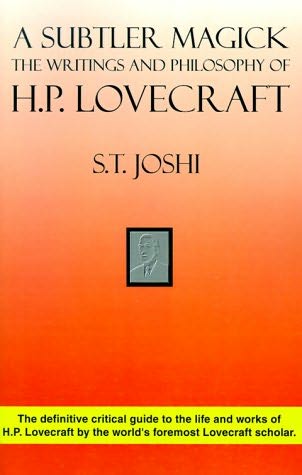A Subtler Hoax
 Tonight I started reading S.T. Joshi's A Subtler Magick: The Writings and Philosophy of H.P. Lovecraft, generally considered the "definitive critical guide to the life and works." An independent scholar, Joshi earned his acclaim for single-handedly convoking, editing, and establishing the scholarly canon of Weird fiction (Bierce, Poe, Blackwood, Dunsany, Machen, Lovecraft, Smith, Hodgson--essentially those who wrote for Weird Tales magazine) outside of the university academies. Yet, almost immediately, when I read Joshi I get those same disconcerting collywobbles in my head like reading the New Historicist Stephen Greenblatt's writing about Shakespearean plays. Such insights into the historical context can be enlightening for newcomers but one can't help but think scrupulous academics like Greenblatt have placed far too naive faith exclusively in the biographical and historical elements to explain a work of fiction or author.
Tonight I started reading S.T. Joshi's A Subtler Magick: The Writings and Philosophy of H.P. Lovecraft, generally considered the "definitive critical guide to the life and works." An independent scholar, Joshi earned his acclaim for single-handedly convoking, editing, and establishing the scholarly canon of Weird fiction (Bierce, Poe, Blackwood, Dunsany, Machen, Lovecraft, Smith, Hodgson--essentially those who wrote for Weird Tales magazine) outside of the university academies. Yet, almost immediately, when I read Joshi I get those same disconcerting collywobbles in my head like reading the New Historicist Stephen Greenblatt's writing about Shakespearean plays. Such insights into the historical context can be enlightening for newcomers but one can't help but think scrupulous academics like Greenblatt have placed far too naive faith exclusively in the biographical and historical elements to explain a work of fiction or author. New Historicism comes across to me as the sinister, bastard son of Marxist thought, like Edmund in King Lear: clever, but somehow dangerously driven to cruel and petty crimes against innocent victims, almost quite tragic. The chief problem with traditional studies of Lovecraft, as I am realizing, is that its champion, Joshi, knew too much biographically about Lovecraft based on his prolific letter writing. I might attribute this problem to the intellectual slant of Joshi, who, as an atheist, takes his understanding of Lovecraft to the most nihilistic, leftist extreme in his writing, seeing everything exclusively based on historical and biographical events.
Maybe I've taken Northrop Frye's holistic, imaginative literary understanding - based on The Great Code and Anatomy of Criticism - greatly to heart, nevertheless, in the end, I can't help but find New Historical-esque analysis, like Joshi's, unsettling: How can a scholar simply reduce mythic fiction to biography and history?
ADDENDUM: I will admit that Joshi's approach to understanding Lovecraft's own atheistic views, despite what I've written, has some positive scholarly features. Indeed Joshi has a penchant, like Greenblatt, for capturing the (often disturbingly stark and realistic) intellectual, historical and social atmosphere of Lovecraft's world and mindset. This is where New Historicism is admittedly beneficial--it only errs when it lapses (perhaps only in my own mind) into seeing an author and his (or her) works exclusively in terms of biography and history.


0 Comments:
Post a Comment
<< Home